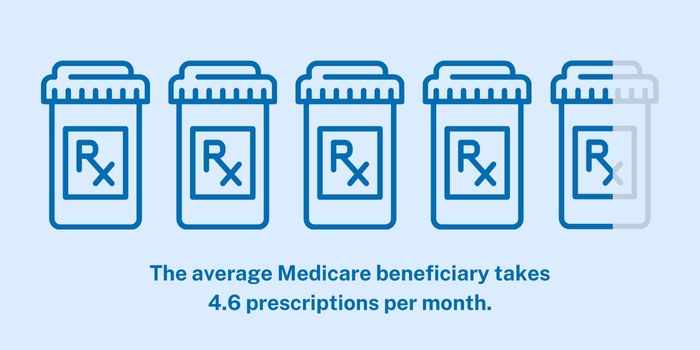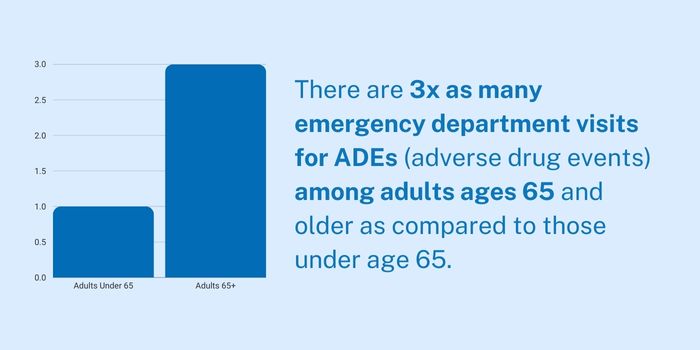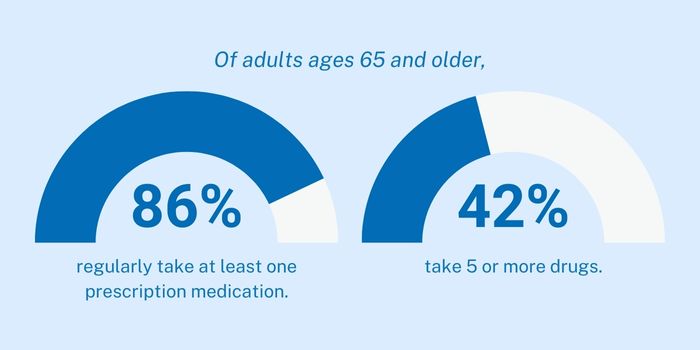What You Need to Know About Drug Interactions in Older Adults
First, let’s look at the numbers when it comes to medication management and seniors.
Roughly 86% of all adults over 65 take at least one prescription medication daily. Another 42% take five or more drugs. This increases the likelihood of drug interactions in older adults or adverse drug events (ADE).
Taking multiple medications at once is called polypharmacy, and it’s very common among seniors. For example, if you have diabetes, high cholesterol and high blood pressure, you’ll likely be prescribed three different medicines to help you manage these three conditions.
We know that it can be challenging, and sometimes frustrating, to try to help your loved one with their medicines. Even simply filling a weekly pillbox can be a daunting task. Wouldn’t it be wonderful if someone could manage your loved one’s prescriptions, giving you the peace of mind you need and deserve? At Brunswick Cove, our skilled nursing community in Winnabow can help through our medication management. Want to know more? Just take the next step and contact us.
What can you do to safeguard the health of those you love? We’ll provide some facts and answer your questions about drug interactions in older adults, including how skilled nursing can provide support and relief.
Drug Interactions in Older Adults and Why Are the Elderly at Higher Risk for Drug Interactions?
One reason seniors are at greater risk is simply because they are usually taking several medicines at once. As we mentioned earlier, it’s not unusual for older Americans to be treated for three or more chronic diseases. When you add over-the-counter medicines into the mix, you can see how the elderly need to be proactive when it comes to their medication.

Source: AARP
But it’s more than a mere numbers game. There are other reasons the older adult in your life could experience an ADE. Some of those risk factors are:
Many Healthcare Providers
Do you often rush your loved one from one appointment to another? Seniors often see a variety of specialists, and if care is not carefully coordinated, there’s a risk of drug interaction.
That’s why our medication management services benefit our residents at Brunswick Cove skilled living community in Winnabow. We make sure to reconcile all medications, meaning we check with each healthcare team member to ensure there haven’t been any changes. This way, all their doctors know exactly what medications they’re taking.
Over-the-Counter Medications
Older Americans tend to have more aches and pains than when they were younger. As a result, they frequently reach for over-the-counter medicine, whether that’s to get rid of a headache or to avoid seasonal allergies.
However, even over-the-counter products can interact with prescription medication. Seniors should also be cautious if they use herbal remedies. Although these are “natural” products, they can still cause drug interactions. In addition, it’s important to realize that herbal supplements aren’t monitored in the same way as prescription medicine. Herbal remedies are not regulated by the FDA.
Issues With Liver and Kidney Function
Your kidneys and liver are vital to ensuring waste leaves your body. When they’re not working well, it means toxins can build up, causing serious health issues.
According to the University of Florida’s Department of Physiology and Aging, sometimes the liver and kidneys don’t function well as we age. In fact, more than half of those over the age of 75 are believed to have some form or stage of kidney disease. Aging is also considered a risk factor for liver disease.
When the liver and kidneys are not working at their optimal level, your loved one is at greater risk of an adverse drug event (ADE).

Source: AARP
Are There Any Medications Older Adults Should Avoid?
The answer to this question involves a frank and honest conversation with your doctor or healthcare team. Everyone is different, and a medicine that may cause problems in one person may not with another.
That being said, there are some medications older adults should use with extreme caution and closely follow all physician directions.
Medication Side Effects in Older Adults
Be careful with medications if you have kidney or liver disease. Some medicines can affect how well those organs function. In addition, carefully monitor your blood sugar when taking medicines for diabetes in order to keep your blood sugar from getting too low.
Any muscle relaxers, sleeping pills or medication for anxiety can make you feel groggy and even increase your risk of falling, so only use them under the supervision of a doctor.
But let’s be clear: Do not change your medication or dosages without talking to your doctor first! It’s vital that you and your healthcare team work together to ensure you get the medicine you need in a way that is both safe and effective.

Source: AARP
Medication Management at Brunswick Cove: Keeping Your Loved One Safe From Adverse Drug Events
When you are no longer able to provide the level of care your loved one needs, it’s stressful. You experience powerful emotions that may sometimes feel overwhelming. We want you to rest assured that our skilled nursing care from our friendly and experienced team at Brunswick Cove frees you from this worry—allowing you to transition from the role of caretaker back to your role as son, daughter, or spouse.
We’re family-owned and operated, which means we have a vested interest in your community. Our all-inclusive pricing means you won’t have any unpleasant surprises, and we can offer every level of care your loved one needs. Are you ready to take the next step? Contact us today.
Key Takeaways:
- Because most seniors take more than one medication to treat several different diseases, they are at greater risk for drug interactions.
- The extended use of over-the-counter medications and declining kidney and liver function also contribute to this risk.
- The key to avoiding drug interactions is to speak with the healthcare team and closely follow all physician instructions.
- Medication management at a skilled nursing community in Winnabow can help your loved one keep track of medicines and reduce the chances of an adverse drug event.
- Any questions concerning medication should be addressed to your physician and healthcare team.
The content within this article and others on this website is only for educational purposes and should not be considered as medical advice. For any questions or concerns, please consult with your healthcare provider.

